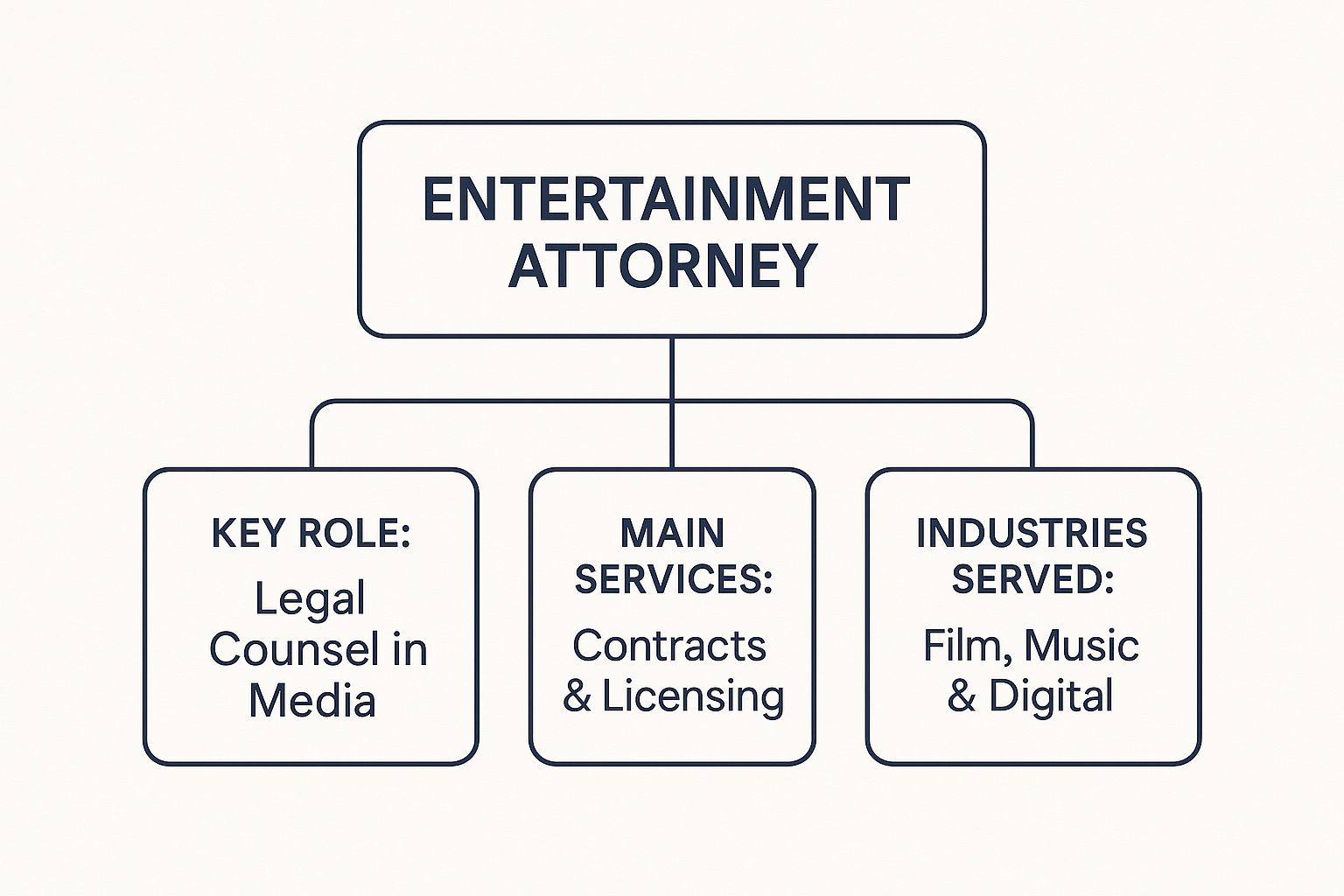Ever wondered who's behind the scenes, making sure your favorite artists are protected and those blockbuster movie deals actually happen? The short answer to what is an entertainment attorney is this: they are specialized legal experts who know the ins and outs of the entertainment world's complex business and legal side.
Think of them less like a traditional lawyer and more like the strategic architect of a creative's career. They build the solid legal foundation that allows art to thrive, both safely and profitably.
Your Guide to Entertainment Law and Your Career
An entertainment attorney is, in many ways, your career co-pilot. While you鈥檙e in the driver's seat focusing on creating, they're navigating the intricate legal and business machinery whirring in the background. Their job is to take your creative vision and translate it into legally sound, financially smart agreements that protect your work and push your career forward.
This legal niche really took off in the 20th century, right alongside the rise of Hollywood's studio system. The complex contracts and royalty deals of that era demanded expert legal eyes. Today, an entertainment attorney is a must-have for everyone from musicians and actors to major studios and production companies. You can dive deeper into the history and growth of this unique legal field.
A Career Architect in Action
Imagine trying to build a house without a blueprint or a general contractor. You might have amazing ideas for the design, but without an expert managing the foundation, framing, and permits, the whole project could easily fall apart. An entertainment attorney provides that exact kind of structural integrity for your career.
They're responsible for things like:
- Negotiating Contracts: Making sure record deals, film agreements, or publishing contracts are fair and work in your favor.
- Protecting Intellectual Property: Guarding your songs, scripts, and brand identity from being misused or stolen.
- Structuring Deals: Building the financial and legal framework for everything from indie films to massive world tours.
This image below breaks down how their central role as a legal guide branches out across different services and creative industries.

As you can see, their core function as legal counsel extends into drafting all sorts of contracts and serving a wide array of creative sectors.
To give you a clearer picture of their day-to-day work, the table below summarizes their key responsibilities.
Key Responsibilities of an Entertainment Attorney at a Glance
| Area of Responsibility | What It Involves | Example Client |
|---|---|---|
| Contract Negotiation | Drafting, reviewing, and negotiating all types of agreements (e.g., recording, publishing, touring, appearance). | A musician signing their first record deal. |
| Intellectual Property | Securing trademarks for band names and copyrights for songs, scripts, or other creative works. | A screenwriter protecting their new film script. |
| Deal Structuring | Setting up the legal and financial framework for projects like film production or music tours. | A film producer securing funding and talent. |
| Dispute Resolution | Handling disagreements over royalties, contract breaches, or intellectual property infringement. | A band in a dispute over songwriting credits. |
| Business Formation | Helping artists or production companies form LLCs or corporations to manage their business affairs. | A YouTuber forming a business to manage their brand. |
This table just scratches the surface, but it shows the diverse ways an attorney can be a critical part of a creative team.
Key Takeaway: An entertainment attorney does way more than just look over documents. They are strategic partners who actively create opportunities and defend your creative work from problems before they even pop up.
What an Entertainment Attorney Actually Does

So, what does an entertainment lawyer鈥檚 day-to-day really look like? Forget the flashy stereotypes. Their job is a dynamic mix of legal strategy, tough negotiation, and constant protection. They鈥檙e the ones who turn your creative vision into a tangible, legally solid, and profitable career.
Imagine you're a musician who just got offered your first record deal. It's an incredible moment, but that contract is a beast鈥攄ense with complicated clauses about advances, royalties, and who owns what. The attorney's job is to tear that document apart, spot the hidden traps, and negotiate terms that build your career, not cage it.
This same idea applies everywhere in the industry, from a screenwriter selling their first film option to a YouTuber signing a big brand partnership. A good lawyer makes sure every single line of a contract is working for you.
Building Your Legal Fortress
Think of your creative work鈥攜our music, your script, your unique brand鈥攁s your most valuable asset. An entertainment attorney is the architect and builder of a legal fortress around that asset. In legal-speak, we call this intellectual property (IP).
Their main tools for building this fortress are:
- Copyrights: They鈥檒l formally register your creative works, like songs or screenplays, with the U.S. Copyright Office. This creates a public record of your ownership, which is absolutely vital if you ever need to defend your work against infringement.
- Trademarks: They help you lock down trademark protection for your band name, logo, or that catchphrase everyone knows you for. This stops others from using your brand identity to confuse your audience or cash in on your hard-earned reputation.
This kind of proactive protection is what transforms a cool idea into a defensible, money-making asset. It鈥檚 the difference between just having a hit song and owning a hit song.
Expert Insight: An attorney鈥檚 most important work often happens before a deal is even on the table. By getting copyrights and trademarks secured early, they create the legal leverage you need to negotiate from a position of strength, not desperation.
Quarterbacking the Deal and Solving Problems
Beyond contracts and IP, an entertainment lawyer often acts as the central hub for your biggest career moves. They are deal-makers who connect talent with opportunities and make sure all the moving parts fit together legally.
For instance, when a production company wants to feature a famous song in a new Netflix show, an attorney handles the entire complex process of music clearance. This means tracking down all the rights holders鈥攆rom the songwriter to the publisher to the record label鈥攁nd negotiating a license with every single one. Without this legal green light, the show could be hit with massive lawsuits.
They play a similar role in:
- Securing Financing: For independent filmmakers, lawyers are key to structuring investment deals and drafting agreements that protect both the creator and their investors.
- Resolving Disputes: When fights break out over royalties, credits, or contract terms, a lawyer steps in to mediate and fix the problem, hopefully long before it turns into a costly and public lawsuit.
Their job is to clear the roadblocks so your project has a smooth path to success. Every contract they tackle is a new puzzle, and you can learn more by understanding contracts for entertainment and how they keep you protected.
Who Really Needs an Entertainment Attorney?

It鈥檚 a common mistake to think that only A-list movie stars or chart-topping musicians need serious legal protection. The truth is, if you're serious about building a career or a business in the entertainment world, you need an expert in your corner. Professional legal guidance isn't some luxury鈥攊t's a foundational part of your business.
The need for an entertainment attorney pops up the very moment your creative passion starts to look like a business. This can happen long before you鈥檙e famous. It鈥檚 all about protecting your work and your future right from the start.
Creatives Who Benefit Most
Frankly, anyone making a living from their creative output should at least consider legal counsel. The stakes are often way higher than people think. A single unsigned or poorly worded contract can completely derail a promising career before it even gets off the ground.
Here are just a few examples of creative pros who rely on these specialized lawyers:
- Musicians and Bands: From hammering out a record deal or distribution agreement to clearing samples for a new track, an attorney ensures you get paid fairly and keep control over your music. They're absolutely vital for navigating the tangled web of publishing and royalties.
- Actors and Performers: Their lawyer is the one who reviews and negotiates everything. This could be a talent agreement for a film role or an appearance contract for a public event. It's all about protecting their rights, their pay, and their image.
- Authors and Screenwriters: An attorney helps lock down a script with an option agreement, negotiates a publishing deal for a novel, and makes sure the author's rights are protected if their work gets adapted for the screen.
- Digital Creators and Influencers: For a YouTuber or TikTok star, a lawyer is crucial for making sense of complex brand partnership contracts, dealing with intellectual property claims, and setting up the right business entity to manage their growing brand.
Key Insight: The common thread here is any transaction involving creative work. Whether it鈥檚 a song, a script, or your personal brand, an entertainment attorney makes sure its value is legally recognized and protected.
A Pillar of a Multi-Trillion Dollar Industry
The global entertainment and media market is a massive economic engine. With a projected value of over $2.7 trillion annually, the whole industry leans heavily on entertainment attorneys to manage the immense legal complexities of creating, distributing, and owning content.
These lawyers are the ones drafting and negotiating the contracts that form the very bedrock of this industry, protecting creative assets valued in the hundreds of billions. You can to see just how critical this expertise really is.
Ultimately, understanding what is an entertainment attorney means seeing them as a proactive guardian of your career. They don't just solve problems鈥攖hey prevent them from happening in the first place and help unlock opportunities you might not even see. That makes them an indispensable partner for any serious creative professional.
How Entertainment Attorneys Get Paid

Let's talk about the money. Hiring a top-tier legal professional is a serious investment in your career, and understanding how they get paid is crucial for planning your next move. When you ask, "what is an entertainment attorney," you're also asking how you'll afford their essential skills.
There鈥檚 no simple price tag. The final cost depends on the lawyer's reputation, how complex your situation is, and the specific payment structure you both agree on. Getting familiar with the common fee arrangements will help you walk into that first meeting feeling confident and prepared.
Common Fee Structures Explained
Most entertainment lawyers use one of a few standard billing models. The right one for you really depends on whether you need someone on call for ongoing support or just help with a single, well-defined project.
Here are the most common ways attorneys bill for their time:
- Hourly Rate: This is the most straightforward model out there. Your attorney bills you for every hour they spend working on your case. This includes everything from phone calls and emails to contract reviews and tense negotiations. Rates can swing wildly based on a lawyer's experience and where they're located.
- Flat Fee: For a specific, one-off task like reviewing a recording contract or filing a trademark, an attorney might quote a single, upfront flat fee. This is great for budgeting because you know exactly what you鈥檒l pay, no matter how many hours the lawyer actually spends on it.
- Retainer: Think of a retainer as putting a lawyer "on call." You pay an upfront fee to secure their availability for a certain period. This money goes into a trust account, and the attorney deducts their hourly fees from it as they complete work for you. It's a common setup for artists and companies who need consistent legal advice.
Key Takeaway: Always, always get a clear fee agreement in writing before any work starts. This document should spell out the billing method, the rates, and exactly what services are included. It's your best defense against future misunderstandings.
The Concept of "Points" or Percentages
Once you get into bigger deals or if you're a more established artist, you'll hear about lawyers working on a percentage basis鈥攐ften called "taking points." In this scenario, the attorney takes a cut, typically between 5% and 10%, of the gross income from a specific deal they helped negotiate.
This model is powerful because it ties your attorney's success directly to your own. If they land you a hugely profitable deal, they get a bigger payday, too. It鈥檚 a massive motivator for them to fight for the best possible terms. You'll see this most often with major record deals, film financing agreements, and big-money publishing contracts.
This variety of fee structures leads to a wide salary range for lawyers in this field. The national annual salary for entertainment attorneys in the U.S. can go from around $55,000 to $278,000 or more, all depending on their experience and the kinds of clients they represent. You can and what drives those numbers. Picking the right fee structure ensures your legal partner is fairly paid for the vital role they play in your career.
Finding the Right Entertainment Attorney for You
Finding your legal champion shouldn't feel like a shot in the dark. Choosing the right entertainment attorney is one of the most important business decisions you'll make in your creative career, so it's vital to have a clear strategy. This isn't just about finding any lawyer; it's about finding a true partner who gets what you're trying to build.
Your search can start with a few trusted sources. Industry referrals are often the gold standard鈥攁sk respected colleagues, managers, or mentors who they trust with their legal work. Additionally, state bar associations, like the New York State Bar Association鈥檚 Entertainment, Arts & Sports Law (EASL) Section, are excellent resources. These organizations often have referral services and directories full of credentialed specialists.
Qualities That Truly Matter
Beyond a law degree, you need someone with specific, relevant experience. Trust me, a lawyer who specializes in film financing won't be the best fit for a musician trying to hammer out a record deal. Look for an attorney whose expertise directly matches your corner of the entertainment world.
When you're checking out potential candidates, zoom in on these key qualities:
- Proven Industry Experience: Do they have a track record of success in your specific field (e.g., music, film, digital media)? Ask for examples of deals they have recently handled that are similar to yours.
- A Powerful Network: A well-connected attorney can open doors. Their relationships with studio executives, label A&R reps, and other key players can be just as valuable as their legal advice.
- Communication and Chemistry: You have to be able to communicate openly and honestly. Do they actually listen to your goals? Do they explain complex legal concepts in a way you can understand? This partnership is built on trust, so a good personal connection is non-negotiable.
Key Takeaway: The best entertainment attorney for you is a specialist. Don't settle for a generalist. Their niche expertise is what gives you a critical advantage in negotiations and career planning.
Your Consultation Checklist
Your initial consultation is your chance to interview them, not the other way around. Come prepared with a list of questions to help you figure out if they're the right fit. This is your shot to understand their approach, their track record, and how they would handle your specific needs. The legal landscape in major hubs can be particularly complex, so if you're working there, you might want to learn more about the specifics of entertainment law in New York to help shape your questions.
Here are some essential questions to have in your back pocket:
- What is your experience with clients at my career stage?
- Can you describe a challenging negotiation you handled for a client like me?
- How do you structure your fees? (Ask for a detailed breakdown).
- Who at the firm will be my primary point of contact?
- What is your communication policy? How often can I expect to hear from you?
By following this roadmap, you can move beyond simply wondering "what is an entertainment attorney" and confidently select a legal partner who will champion your success.
Common Myths About Entertainment Lawyers
The world of entertainment law can feel pretty mysterious, and a lot of myths have popped up that give creatives a skewed idea of what we actually do. Let's pull back the curtain and tackle some of the biggest misconceptions I hear all the time. Getting this stuff right is the first step to understanding how valuable a good lawyer can be for your career.
One of the most persistent myths is that entertainment lawyers are only for A-list celebrities and massive studios. I can't tell you how wrong this is. The truth is, an up-and-coming musician about to sign their first distribution deal faces the exact same legal minefield as a superstar. The same goes for a screenwriter optioning their very first script.
Legal protection isn't a luxury for the famous; it's a necessity for anyone who is serious about turning their art into a business.
They Are Not Just Fixers
This leads to another huge, and often costly, mistake: thinking you only need a lawyer when something goes wrong. Treating an attorney like a 911 call is a reactive move, and it's one of the worst things you can do for your career.
If you're waiting until you're in the middle of a contract dispute or a copyright nightmare, you're already playing defense. The most important work I do for my clients happens before there's a problem. A good lawyer is a career architect, not just a firefighter. Our job is to build a solid legal foundation from the start so those problems never have a chance to happen.
Key Insight: Think of an entertainment attorney like a structural engineer for your career. You bring them in at the beginning to make sure everything is built correctly, not after the walls have already started to crumble.
Agents and Lawyers Are Not the Same
Okay, this is a big one. It鈥檚 maybe the most critical myth to bust: the idea that your agent or manager can do the same job as your lawyer. While they are all essential members of your team, their roles are completely different and you absolutely need to know the distinction.
- An Agent's Role: Their main job is to hustle for you. They find and book opportunities鈥攁uditions, gigs, speaking engagements, you name it. They are the deal-finders.
- An Attorney's Role: Our job is to dive deep into the legal terms of those deals. We analyze them, negotiate them, and structure them to protect you. We are the deal-shapers.
An agent gets you in the door; an attorney makes sure the room you're walking into isn't a trap. We're focused on making sure the contract for that great gig doesn't sign away your rights, your intellectual property, or your financial future. That's licensed legal advice鈥攕omething agents and managers simply can't (and shouldn't) provide.
Your Frequently Asked Questions Answered
Navigating the next steps in your creative journey often brings up a lot of questions. Here are some clear, straightforward answers to the most common things we hear from artists, creators, and entrepreneurs about working with an entertainment attorney.
When Is the Right Time to Hire an Entertainment Attorney?
The simple answer? Before you sign anything important. I'm talking about any kind of record deal, publishing contract, management agreement, or film production contract.
Bringing in a lawyer early is a proactive move that ensures your interests are protected right from the start. Think of it as setting yourself up for success, not just damage control. It can prevent incredibly expensive and stressful fights down the road. Even for a brand new artist, a consultation is a wise investment the second you get your first formal contract.
Key Insight: Don鈥檛 wait for a problem to pop up. The right attorney prevents problems from ever happening. It鈥檚 about building a solid foundation for your future.
What Is the Difference Between an Attorney and an Agent?
This is a huge one, and it's critical to understand the distinction. While they are both on your team, their jobs are very different.
- An agent's primary role is to find and secure opportunities for you鈥攖hink auditions, roles, gigs, or book deals. They are the deal-finders.
- An entertainment attorney's job is to handle all the legal details of those opportunities. They negotiate the fine print, protect your intellectual property, and make sure every part of the deal is legally sound. They are the deal-shapers.
An agent gets you in the door; an attorney makes sure you don't get taken advantage of once you're inside.
Can I Just Use a General Lawyer Instead?
You technically can, but it's a massive risk. The entertainment industry runs on its own unique customs, lingo, and legal precedents that a general practice lawyer simply won't be familiar with. It's a world unto itself.
An experienced entertainment attorney understands the industry standards for royalties, rights, and complex deal structures. This specialized knowledge is absolutely crucial for negotiating a fair and competitive contract. Choosing a non-specialist could leave you legally exposed and at a major disadvantage in any negotiation. Trust me, it happens way more than you think.
Ready to protect your creative work and build a secure career? The team at Cordero Law specializes in empowering artists and entrepreneurs with strategic legal counsel. Let's build your future together. Find out how we can help at .
